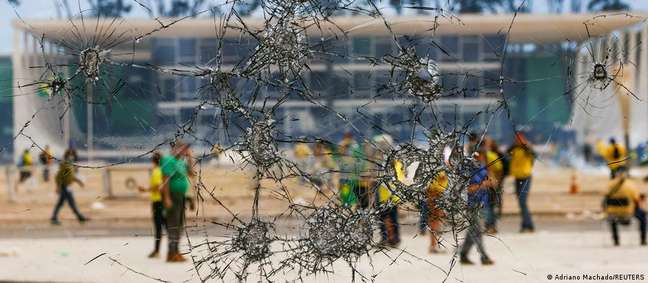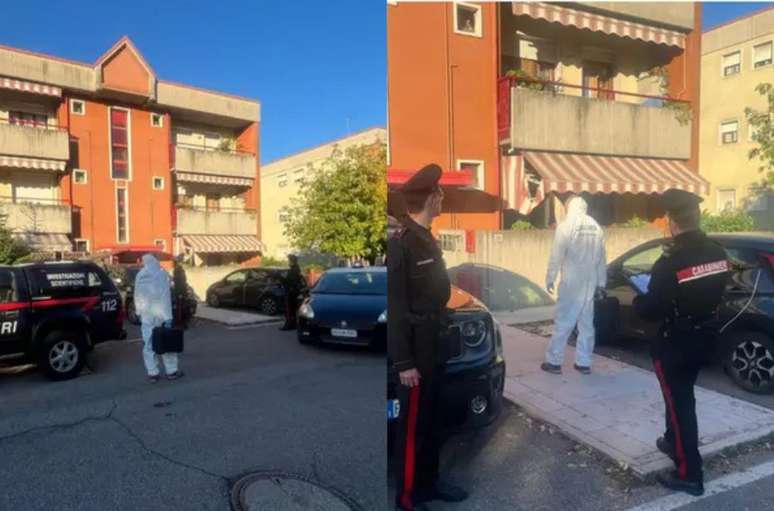At the height of new right-wing extremism in Brazil, Bolsonaristas are promoting terror in Brasilia and leaving a trail of destruction at the headquarters of the Three Powers, the National Congress, the Planalto Palace and the headquarters of the Federal Supreme Court (STF) – marking the most violent moment in post-redemocratization Brazilian politics and the pinnacle of the coup movement seeking to illegally overturn the result of the last presidential election.

The balance between putsch and lying speeches reverberated by far-right figures – including former president Jair Bolsonaro -, the financing and tolerance of the Bolsonarist camps and the clemency of the top security forces with anti-democratic acts could finally be observed this Sunday after the invaders expelled from buildings: rooms destroyed, works of art looted or vandalized, furniture thrown against windows, policemen injured, journalists assaulted and more than 200 coup plotters arrested in the act.
Dressed in green and yellow and preaching a military coup, the Bolsonarists first invaded Congress and then headed for the seats of other powers, without ever being decisively stopped by the security forces of the Federal District, who raised allegations of collusion or incompetence of local authorities.
A National Force vehicle even fell into the stretch of water in front of Congress. At the STF, the coup plotters vandalized the courtroom and used a fire hose to flood the venue. In Planalto they took selfies and broadcast live the destruction of rooms, as well as stealing weapons and cards and vandalizing the gallery of portraits of former presidents.
The looting ended only more than two hours later, after the riot police and the prime minister’s cavalry finally took decisive action against the Bolsonarists.
In recent days, the coup movement has been strengthened by new extremists who have arrived in Brasilia by dozens of buses. On Bolsonarist social networks, this week there was a call for a “seizure of power by the people themselves” scheduled for Congress on January 7 and 8.
The city was already under tension after violent acts committed by Bolsonarists in December, including an attempted bomb attack on the city’s airport.
President Luiz Inacio Lula da Silva, who took office just a week ago, has called the invaders “fanatical fascists” and “Nazis”, blamed his predecessor Jair Bolsonaro for the violence and vowed to find and punish the financiers of Sunday’s acts .
“This genocide has not only provoked it but is also stimulating it through social networks,” Lula said. “We’re going to try to find out who funded this. And all of these people will pay. If there was an omission by anyone in the federal government that facilitated this, they will also be punished.”
Lula was not in Brasilia during the invasion. He had gone to Araraquara (SP) and had transformed the local town hall into a crisis office. The president traveled to Brasilia during the night and inspected the damage in the Planalto.
Condemnations also came from the ministers of the STF. Alexandre de Moraes, seen as an enemy by the Bolsonarists, classified this Sunday’s acts as “terrorist” and said that “former and current financiers, instigators, public agents who continue in the illicit conduct of undemocratic acts” will be held accountable.
Intervention in the Federal District
The Bolsonarist terror day also led Lula to sign a decree of federal intervention in public safety in the Federal District, after the local authorities linked to Bolsonarism were accused of incompetence in crisis management and even of complicity with the putschists.
In recent days, dozens of buses with Bolsonarists have headed to Brasilia to reinforce the coup camp set up months ago in front of the army headquarters without the DF authorities stepping up security at Esplanada dos Ministérios.
Also this Sunday, Lula recalled that this Sunday the prime minister of the DF even escorted a march of coup supporters concentrated in the army headquarters to the Esplanada dos Ministérios.
Faced with the explosion of violence, the governor of the DF, Ibaneis Rocha (MDB), an ally of Jair Bolsonaro, has tried to distance himself from the proceedings and dismissed his security secretary, Anderson Torres, who held the position of minister of Justice under Bolsonaro. Torres had already been accused of complacency with coup plotters during checkpoints last year and in an attempted invasion of federal police headquarters in Brasilia last month.
Just this afternoon, the Advocacy General of the Union (AGU), linked to the federal government, asked the STF to arrest Torres. At the moment, Bolsonarista Torres is in the United States.
Governor Ibaneis, in a clear attempt to evade any responsibility for the violence, posted a video on his networks asking Lula for an “apology” and defining the acts “unacceptable”. Even the politician Valdemar Costa Neto, president of the PL, an acronym for Bolsonaro, has tried to distance himself from the violence in Brasilia. “We don’t support these movements,” said Valdemar, who after Bolsonaro’s defeat even tried to challenge the result in court with an unfounded claim.
With the federal intervention, the security of the DF will be commanded by Ricardo Garcia Cappelli, executive secretary of the Ministry of Justice, which in turn is commanded by Flávio Dino. “No one will go unpunished. The democratic rule of law will not be blocked by criminals,” Cappelli said.
Defense Minister José Múcio, who had been criticized for adopting a more tolerant stance towards the Bolsonarista camps set up in front of barracks across the country, went on Sunday to say that it is no longer possible to “bear” these concentrations.
“We can’t go on like this, we will act, we can’t take it anymore,” said José Múcio, who has come under criticism in the last week for not adopting a more forceful political stance against the camps.
The role of Bolsonaro
Former President Jair Bolsonaro, who left the government two days before Lula took office after failing in his attempts to overturn the poll results, remained silent throughout the day, avoiding condemning the violence that resulted from his self-exile from Florida while invaders occupied buildings.
Bolsonaro spoke just hours after the scammers were expelled. The ex-president published a condemnation protocol on his networks and also attempted to draw a false equivalence with the Brazilian left.
“Peaceful demonstrations, in the form of law, are part of democracy. However, looting and invasions of public buildings as they have occurred today, as well as those practiced by the left in 2013 and 2017, escape the rule,” Bolsonaro said . The former deputy also said he “denies” Lula’s accusations made this Sunday.
Bolsonaro, who after the defeat avoided congratulating Lula and even passing the presidential sash, also said he “always” respected and defended “laws and democracy”, ignoring his own participation in anti-democratic demonstrations against the Congress, the STF and authority elections in recent years.
international reactions
Throughout Sunday, as coup plotters destroyed the headquarters of the Three Powers, Lula received declarations of sympathy and support from foreign governments, including the United States and France, neighbors such as Colombia and Argentina, as well as European Union authorities, who have also condemned Bolsonaria violence.
In a statement, the head of EU diplomacy, Josep Borrell, said that the bloc “reiterates its full support for President Lula and the Brazilian democratic system and expresses solidarity with the democratic institutions targeted by this attack”. A similar statement was made by the President of France, Emmanuel Macron.
US politicians were quick to draw parallels to the invasion of the Capitol by a mob of right-wing extremists on January 6, 2021. As happened in Brasilia, the US coup plotters who vandalized the seat of Congress in their country were also emboldened by a radical leader defeated for trying to illegally overturn the outcome of a presidential election.
After the invasion of Brasilia, US President Joe Biden condemned “the attack on democracy and the peaceful transfer of power in “Brazil”, and affirmed that “Brazilian democratic institutions have our full support”.
US lawmakers are calling for Bolsonaro’s extradition
After the terror scenes in Brasilia, two US lawmakers criticized Jair Bolsonaro’s stay in the United States. Democratic Representative Joaquin Castro has requested the extradition of the former president, currently in Florida.
“He is a dangerous man. They should send him back to his country of origin, Brazil,” said the deputy. “I support President Lula and the democratically elected government in the country,” concluded the democrat, who also linked the invasion of Brasilia with the attack on the US Capitol in 2021. “Domestic terrorists and fascists cannot use the playbook of Trump to undermine democracy”.
Democratic Representative Alexandria Ocasio-Cortez of New York also linked the events in Brasilia with the Capitol, saying “we see fascists trying to do the same in Brazil.”
In the same message, he expressed solidarity with Lula and the end of Bolsonaro’s “shelter” in the United States.
+The best content in your email for free. Choose your favorite Terra newsletter. Click here!
Source: Terra
Camila Luna is a writer at Gossipify, where she covers the latest movies and television series. With a passion for all things entertainment, Camila brings her unique perspective to her writing and offers readers an inside look at the industry. Camila is a graduate from the University of California, Los Angeles (UCLA) with a degree in English and is also a avid movie watcher.






